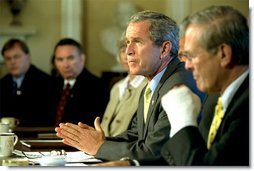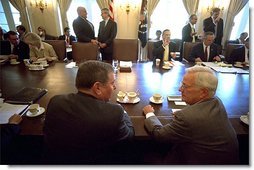
- Afghanistan
- Africa
- Budget Management
- Defense
- Economy
- Education
- Energy
- Environment
- Global Diplomacy
- Health Care
- Homeland Security
- Immigration
- International Trade
- Iraq
- Judicial Nominations
- Middle East
- National Security
- Veterans
|
Home >
News & Policies >
July 2002
|
For Immediate Release
Office of the Press Secretary
July 31, 2002
President Discusses Economy, Middle East Following Cabinet Meeting
Remarks by the President in Photo Opportunity with the Cabinet
The Cabinet Room
11:34 A.M. EDT
 THE PRESIDENT: Thank you all for coming. First, I want to condemn
in the strongest possible terms the attack that took place in Israel.
There are clearly killers who hate the thought of peace, and,
therefore, are willing to take their hatred to all kinds of places,
including a university. And this country condemns that kind of
killing, and we send our deepest sympathy to the students and their
families.
THE PRESIDENT: Thank you all for coming. First, I want to condemn
in the strongest possible terms the attack that took place in Israel.
There are clearly killers who hate the thought of peace, and,
therefore, are willing to take their hatred to all kinds of places,
including a university. And this country condemns that kind of
killing, and we send our deepest sympathy to the students and their
families.
I also want to make it clear to the killers that it won't stop us from rallying the world to fight their kind of terror; nor will they stop us from having a vision of peace.
I look forward to continuing to work with all responsibility parties in the region, starting to insist that they work with us to stop this terror -- use all their power to stop organizations such as Hamas from taking innocent life. And at the same time that we do so, we must continue to work to put the institutions in place necessary for the evolution of a state which can live at peace with Israel.
Secondly, we met today and talked about our economy. There is some statistics out today that showed our economy continues to grow. Second quarter growth was 1.1 percent. When you combine that with the first quarter growth, it's a 3-percent growth. This is a positive trend. We're heading in the right direction. But the growth isn't strong enough, as far as I'm concerned.
And so I look forward to working with Congress to pass a trade bill, a bill which will be good for American workers, American farmers, American ranchers. I look forward to working with Congress to pass a terrorism insurance bill, a bill which will help stimulate construction work, which will help our workers -- those who build buildings, and construction people who work on projects. I look forward to working with Congress to show fiscal restraint when it comes to budgeting and spending the taxpayers' money. I believe Congress ought to make the tax cuts permanent, so our small businesses and taxpayers can plan with certainty.
 As well, we discussed this corporate fraud task force with the
Attorney General, and he and I share the same strong commitment to
ferret out those who have cheated employees and workers and bring them
to justice, which we will continue to do.
As well, we discussed this corporate fraud task force with the
Attorney General, and he and I share the same strong commitment to
ferret out those who have cheated employees and workers and bring them
to justice, which we will continue to do.
So I appreciate my Cabinet coming and sharing ideas about how we can continue the positive trends, so that the people who want to find a job can find one here in America.
I'll answer some questions. Lindlaw.
Q Mr. President, what's your position on American companies moving their headquarters to foreign tax havens? Should it be outlawed? Did Harken do this while you were a director?
THE PRESIDENT: Moving their headquarters?
Q Yes, to foreign tax --
THE PRESIDENT: I don't recall Harken moving their headquarters. I think there was an issue over a arrangement with Bahrain, a drilling venture there, which I opposed, as you may recall, when I was a director of the company.
Q Should the practice be outlawed now?
THE PRESIDENT: I think we ought to look at people who are trying to avoid U.S. taxes as a problem. I think American companies ought to pay taxes here, and be a part -- good citizens. But as far as the Harken issue, we'll try to answer all your questions on that.
Q Mr. President --
THE PRESIDENT: Excuse me for a second.
Q I'm sorry, sir.
THE PRESIDENT: Yes.
Q The Jordanian Foreign Minister is pressing for a detailed work plan for a Middle East peace accord. Is this something that's worth pursuing?
THE PRESIDENT: Well, I think it's interesting. What's worth pursuing is a detailed plan toward achieving these objectives: a security force that exists to fight terror, not keep certain officials who haven't been able to deliver on the war against terror in office; a security force that will cooperate with people who care about achieving peace, and will provide security not only for the Palestinians, but for the neighborhood.
Secondly, progress toward the writing of a constitution, which will enable a state to evolve that is -- that will be at peace with its neighbor. These institutions, by the way, are incredibly important to -- because it's -- peace is bigger than an individual. There needs to be institutions in place that last longer than a particular individual.
And the Palestinians -- the voice of the Palestinians, those who desire peace, needs to be heard. And so reform of these institutions are an incredible part of achieving what I believe His Majesty wants, which is two states living side by side in peace. Eventually there will be a peace conference, but there needs to be steps leading up to the peace conference, where all of us do our jobs about putting those institutions in place that will lead to peace, so we all have confidence.
Listen, one of the things that we care deeply about is the plight of the Palestinian family, the Palestinian people. These people live in squalor, and they're poor, and they're downtrodden. And there's nothing more that we'd like to do is to work with our friends to provide humanitarian assistance, a strong package of aid to help these poor people that have, frankly, been used as pawns in the peace process over the decades.
However, it's so important before we spend money that we're confident the money is not going to be stolen, that it be -- that the anti-corruption reforms be in place. So these are all steps necessary, Steve, to get to where we want to get.
Yes, Dick.
Q Mr. President, are you concerned at all that consumer confidence, which came in at kind of a low number yesterday, is a harbinger of things to come, particularly as people watch their stock portfolios erode and vanish? Will this make them less likely to spend, and put more pressure on the recovery?
THE PRESIDENT: I think -- look, let me just give you my own consumer confidence index. I am positive about the -- our economy. I feel very optimistic about it, because I look at the facts. And the facts are that inflation is low, interest rates low, productivity is high. We're going to get a trade bill which will help, presuming the Senate acts this week. I feel strongly that they're -- that having -- now it turns out, having been through three-quarters of negative growth, when I first came into office we've had three-quarters of positive growth, I think that's the right trend, Dick.
So I'm optimistic about this, and I think when the American people take a look at the facts and are confident about those facts, like I am, they will -- they're going to realize we've got a bright future ahead of us. And I am upbeat. And I think most of the people around this table are upbeat about the prospects for people being able to find work.
Thank you all.
END 11:41 A.M. EDT


